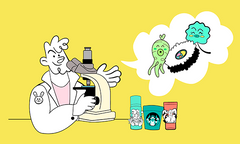Agüita, baby – moisturizing for your skin
Moisturizing is like eating 5 pieces of fruit/vegetables a day. 🍉🍌🍐 Your mother and grandmother have been saying it all their lives, they say it from time to time on the radio or TV... but you never think about why they advise it or the specific benefits.
Today we tell you the basics of moisturizing creams and analyze the most hackneyed phrases in advertisements so that you don't get fooled.

Why hydrate your face with creams?
Come on, the basic thing is that water is necessary in our lives (you already know... drink 1-2 liters a day).
But drinking is not enough for your face. It also doesn't help to get it too wet, because the water molecules are too large to penetrate the skin and the water evaporates throughout the day.
Hence we use creams to reinforce hydration.
A dehydrated face... is the one you get on Saturday mornings with a hangover: a little swollen, rough, you can see wrinkles and expression lines that don't show up as much every day, you can see dark circles and some blemishes. , …
And hydration, then, serves just the opposite:
- You look better instantly: with more flexible, soft and 'juicy' (not shiny) skin.
- It forms a protective shield against external agents, pollution, climate,...
- You prevent moves; that dry skin is the prelude to dermatitis, peeling, inflammation and irritation,…
- Delays the appearance of wrinkles
- …
Koreans even have a word for when the skin looks fresh and perfect: chok chok (촉촉). That word is also synonymous with 'wet' (which is very different from 'shiny' or 'greasy').
HOW DOES A MOISTURIZER WORK?
A moisturizer has 2 'basic' functions
- Moisturize: that is, attract water and retain it in the skin.
- Occlude: that is, create a (literal) layer above the skin that prevents water from evaporating
- Emollients that smooth and soften the surface of the skin,
- Ingredients to restore the integrity of the skin (if you already have it damaged),
- Ingredients to improve the natural hydration index of your skin,
- Ingredients to improve the activity of aquaporins (which are like the slides in the aquapark, transporting water between cells).
- …
With this said, we delve into the myths and most heard phrases.
❌ "IF you drink a lot of water, you don't need to use creams"
Drinking a lot of water is the minimum… but not enough.
There is a study (there is not much relevant literature on this) that says that to see significant effects on the skin, you should drink 4 liters daily. So the cream is more profitable for you.
❌ "IF I HAVE OILY SKIN OR ACNE, IT'S BETTER NOT TO USE MOISTURIZERS"
Absolutely not. Maximum SHIT. In these cases (well, in general in all) a moisturizer is more than necessary. Oily skin and acneic skin in general produce more sebum than the rest. Sebum is a very good natural occlusive. But that's only 50% of hydration, remember. You are missing the moisturizing part. It's different if you look for lighter, more watery creams or those that hide your shine. But use moisturizer yes or yes!
❌ "NATURAL OILS ARE GREAT MOISTURIZERS"
Well, in general, no. Oils are good occlusives (creating a barrier) and some have additional properties... but they are also very bad moisturizers. Do not apply just olive, coconut, sunflower, or argan oil (jojoba is saved...) because they cause a false hydration effect.
🧑🏫 What is false hydration?
It is a sensation of momentary relief… but lack of deep hydration. For example, when your lips peel and you end up using a cocoa that you have to replace every 3 minutes?
That's usually a sign that the cocoa (or Vaseline) you've chosen has cool occlusive capabilities... but that it's not treating dry skin thoroughly.
🧑🏫 ARE OIL-FREE CREAMS THEN BETTER FOR BOYS?
Oil-freejust implies that it does not contain oils. Nothing else. That does not imply:
Chupicadvice: trust more the final texture of the product and that that will appeal to you regardless of whether it is advertised as "oil-free."
- That it is not comedogenic, that is, it can cause pimples to appear.
- That the product is not going to cause or worsen acne
- That it turns out 'heavy' with a 'greasy sensation'
🧑🏫 And are creams that say they penetrate the deepest layers of the skin better?
Avoid these types of slogans because they are lies... and they tell you a lot (and badly) about the person who announces it. By definition, a cosmetic remains in the most superficial layers of the skin. If you don't go through the operating room... it is impossible 🤯 (and inadvisable) to penetrate the dermis with a cosmetic.
In summary ...
Moisturizing is necessary, basic and easy to show off your face ALL year round.
What it does is attract water and prevent it from escaping (one thing without the other is useless).
To choose yours, be guided by the one you like the most in terms of texture and result (and so you can easily repeat it every day). Of the rest of the stories... passing.
PS As it could not be otherwise, this week's post is sponsored by our star moisturizing cream, Dragon Shot .
In addition to humectants, occlusives and emollients, we have added ingredients to keep your face from shining throughout the day and Dragon's Blood as an antioxidant for extra. Complete, complete.
The texture? A super light pass that transforms into almost water upon contact with your skin. And a light, rich smell so you will love it in the mornings.

DRAGON SHOT
Moisturizer with water-cream texture and anti-shine for daily use.
Moisturizes THE SKIN, removes shine, AND WITH AN antioxidant EFFECT.
Siwon
We do cool right!



